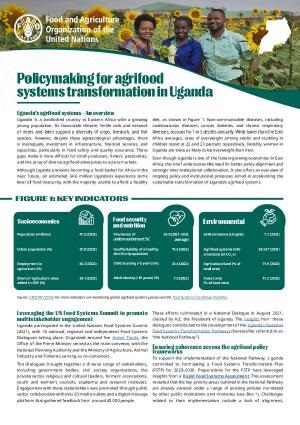Uganda takes steps to finance food systems transformation
Unlocking transformation through aligned finance, inclusion and strategic coordination

Palabek, Uganda. Aloyo Prisca sells her vegetables in an improvised market in the outskirts of her village.
©FAO / Vincent Tremeau
On 24-25 June 2025, over 500 participants in person and online gathered for the Uganda Agrifood Systems Investment and Financing Conference. The two-day event, Catalyzing innovative investments and financing partnerships to transform Uganda's agrifood systems for economic growth, food security and sustainable development, was co-organized by the Ministry of Agriculture, Animal Industry and Fisheries, the Office of the Prime Minister (OPM), FAO and the African Agribusiness Incubators Network, in collaboration with multiple national and international partners.
Bringing together policymakers from across national and local governments, financial institutions, farmers, youth groups, women organizations, development partners, academia, the private sector and civil society, the conference aimed to mobilize the partnerships and resources needed to translate Uganda’s agrifood systems transformation vision into reality.
Bright Rwamirama, Minister of State for Animal Industry, emphasized that the fourth National Development Plan (NDP IV) places food systems transformation at the centre of Uganda's strategy for economic growth, poverty reduction and sustainable development. He also added:
“We must work together to mobilize investment for our food systems, explore innovative and blended financing solutions and promote integrated, systems-based financing that enhances productivity, nutrition, inclusion and climate resilience.”
The conference emphasized three key shifts: aligning budgets across sectors, promoting flexible and inclusive financing mechanisms that ensure the meaningful engagement of marginalized groups, and delivering long-term co-benefits across agrifood systems outcomes.
This aligns with the shift promoted by NDP IV: moving from fragmented, short-term, project-based approaches towards coherent, long-term and programme-based interventions. To catalyse efforts, dialogue around key investment priorities helped identify elements of a shared financing strategy that mobilizes public budgets, private capital and development finance. The aim is to deliver interconnected outcomes – from food security and environmental resilience to economic inclusion and the realization of the right to food – ensuring that gains in one area reinforce, rather than undermine, progress in others.
Ivan Lule, Deputy Chairperson of the National Planning Authority, stressed the importance of a systemic approach to address the complex nature of food systems:
“Since food systems fall in many programmes there is need to work towards common results, break the silos and avoid duplications.”
The discussions highlighted that financing must be people-centred and inclusive, supporting innovations in food safety, digital technologies, value addition and climate-smart agriculture, while ensuring the engagement of women, youth, refugees and marginalized communities. This is particularly relevant in a country like Uganda, which hosts the largest refugee population in Africa.
Participants called for improved access to climate finance, particularly from sources such as the Green Climate Fund and Global Environment Facility, and for national strategies to help the country qualify for these funds, prepare projects better and manage the funds effectively at all levels, including through de-risking investments in agriculture and alignment of public budgets.
The conference concluded with a renewed sense of momentum and willingness of the participants to work collaboratively, which was translated into the commitment to co-create a National Agrifood Systems Financing Strategy, grounded in Uganda's national food systems pathway and aligned with NDP IV, with contributions from Government ministries, international organizations, development partners, civil society and the private sector. The National Food Systems Coordination Committee, chaired by OPM, will oversee and support the development of the strategy to ensure multisectoral coordination, institutional ownership and long-term impact.
FAO's strategic support and coordination across levels
Working closely with the FAO country office, the Agrifood Systems and Food Safety Division (ESF) is supporting Uganda in operationalizing its national food systems transformation pathway. In the framework of the One Planet Network Sustainable Food Systems Programme (OPN SFSP), FAO has provided strategic, technical and facilitation support to the country’s National Food Systems Coordination Committee and across multiple levels to help Uganda advance a systemic approach for agrifood systems transformation.
FAO's support was further strengthened through close collaboration with other initiatives, such as the Hand-in-Hand Initiative (by supporting national investment case proposals) and the Right to Food (by ensuring Uganda's financing vision is grounded in rights-based, inclusive principles).
FAO also facilitated Uganda’s engagement in the 5th Global Conference of the OPN SFSP in Brasilia and is supporting its upcoming participation in the UN Food Systems Summit +4 Stocktaking Moment to showcase its efforts to ensure financing and investment for agrifood systems transformation.
Read more
- FAO Uganda: Uganda Rallies Stakeholders to Mobilize Investment for Agrifood Systems Transformation
- FAO policy brief: Policymaking for agrifood systems transformation in Uganda
- Policy: Fourth National Development Plan (NDP IV) 2025/26 - 2029/30
- FAO Hand-in-Hand: Uganda Investment Proposal
- FAO Right to Food: Calls to integrate the right to food in Uganda's food System transformation agenda
Related publication
Contact
Agrifood Systems and Food Safety Division (ESF)
- José Valls Bedeau, Policy Officer
- Jacopo Schürch, Project Officer
FAO Uganda
- Jean Marie Byakweli, Policy Officer
- Edward Tanyima, National Policy Officer

